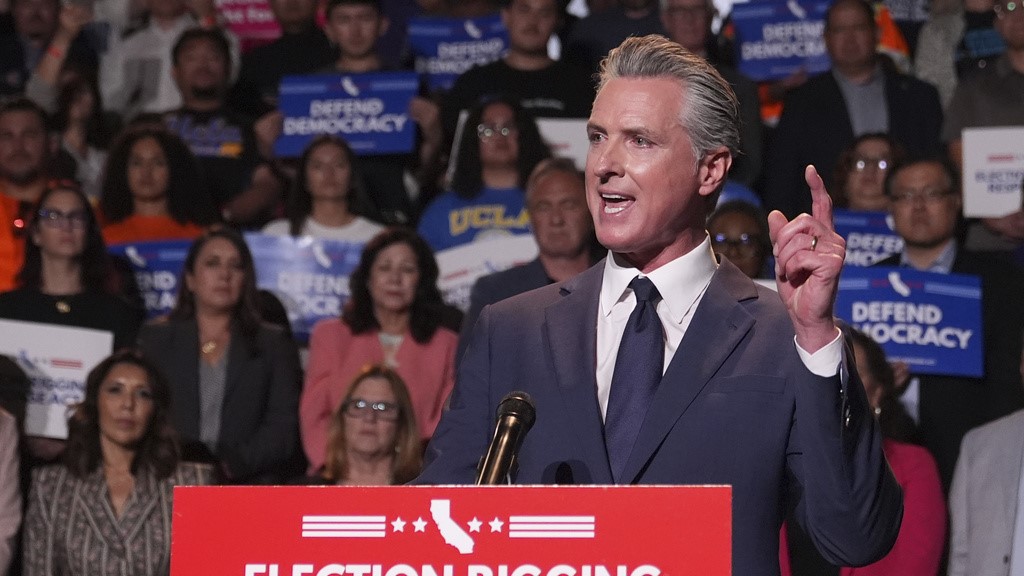Newsom floats redistricting retribution if Texas GOP redraws its maps as midterm election approaches

SACRAMENTO, Calif. (KGO) -- With midterm elections approaching, political leaders across the country are sharpening strategies to retain or flip key congressional seats - and California Gov. Gavin Newsom is signaling a possible shift in redistricting policy if Texas redraws its maps to favor Republicans.
Gov. Newsom has started to voice his frustration over what says is a partisan power grab.
In an interview with liberal news outlet, The Tennessee Holler, Newsom said Republicans are "playing by totally different set of rules," suggesting his state might need to rethink its own "fair play" approach. On Thursday, the governor told liberal news outlet the Tennessee Holler that Republicans are playing by a "totally different set of rules," and suggested the California Legislature - which has a Democratic supermajority in both chambers - could "gerrymander like no other state," if leaders stop "playing fair."
His comments followed Texas Gov. Greg Abbott's announced plans for the GOP-controlled legislature to draw new congressional maps in a special session. Typically, states draw new maps every ten years to account for population changes accounted for in the U.S. Census report. However, Texas is facing lawsuits over the districts legislators drew after the 2020 census that allege the maps discriminate against Latino and Black voters.
"I saw what Gov. Abbott did today ... These guys are not f---ing around," Newsom told the Tennesee Holler. "We've been playing fair but it made me question that entire program. These guys are going to do everything in their power to maintain their power."
What is the difference between redistricting and gerrymandering?
San Jose State University politics professor Melinda Jackson explained the difference between redistricting and gerrymandering.
"Redistricting is a process that is actually mandated every ten years after the census in order to make sure that the districts are evenly distributed," Jackson said. "We don't want to have a district that has ten times as many people as the one next door."
"Gerrymandering is the term we use to describe districts that are drawn to advantage one group or another," she said. "So even though the goal is to have approximately equal population in the districts, where those district lines are drawn can sometimes get quite creative in order to try to keep communities together to give more advantage to one party in the district."
In states like Texas where lawmakers draw their own maps, the result can lead to oddly shaped districts that Jackson says is intended to provide a party with a more comfortable district to win in elections.
"Partisan gerrymandering has not been found to be unconstitutional," Jackson said. "If that state legislature is primarily responsible for drawing the districts, there's an incentive to try to give an advantage to their own party."
Could Gov. Newsom get California to redraw its maps?
Though Newsom hinted that California may want to reconsider its independent approach, making that change wouldn't be easy.
Since the state's redistricting process is enshrined in the California Constitution, voters would have to approve any overhaul. The Legislature would need to propose a new constitutional amendment that would have to be approved by a two-thirds vote in both the Assembly and Senate. Voters first signed off on the creation of an independent commission with Prop 11 in 2008.
"When the voters directly have a say in something, the legislature can't just override them," said Jackson. "It has to go back to the voters."
Still, Jackson said Newsom's comments reflect growing Democratic frustration with what many see as an uneven playing field across the country.
California's current redistricting system is widely seen as a national model. Since the commission's creation, Jackson said the state has seen more politically competitive districts, which she believes is healthier for democracy
The 14-member commission - made up of regular citizens who identify as Republican, Democrat, or Independent- is intentionally designed to exclude current or former elected officials.
"I think in Governor Newsom's comments, what we're seeing is really some of the frustration on the Democratic side about, you know, kind of having a fair playing field in terms of these elections," Jackson said.







